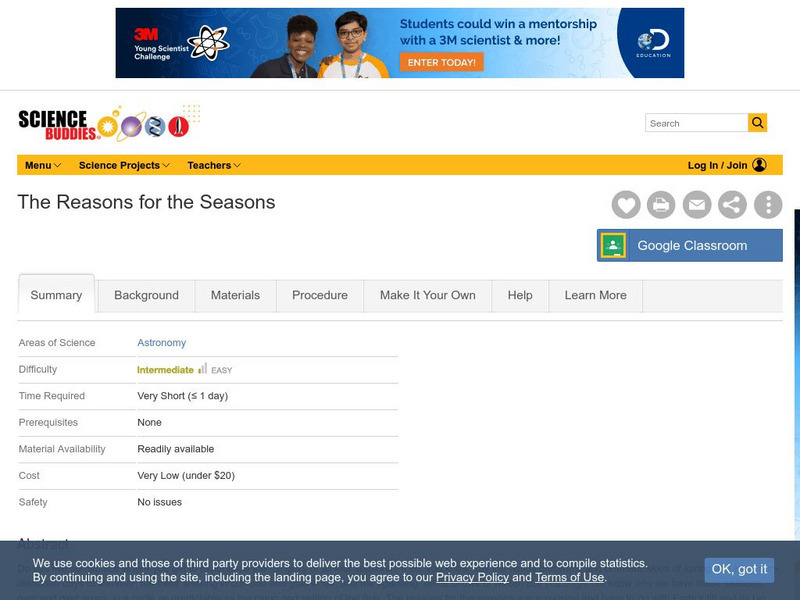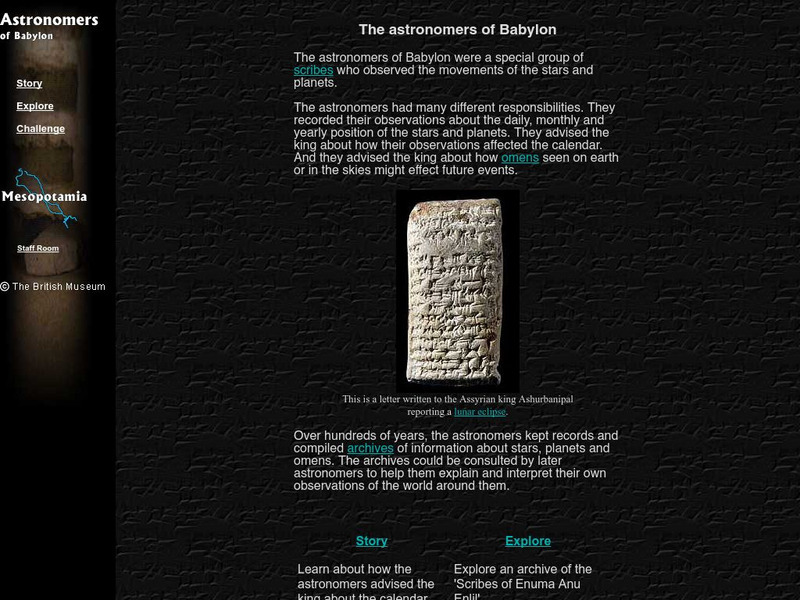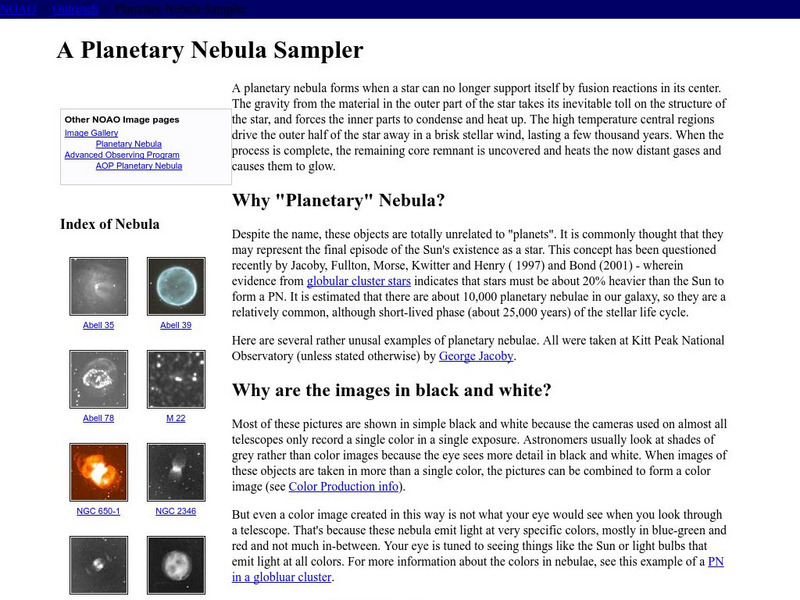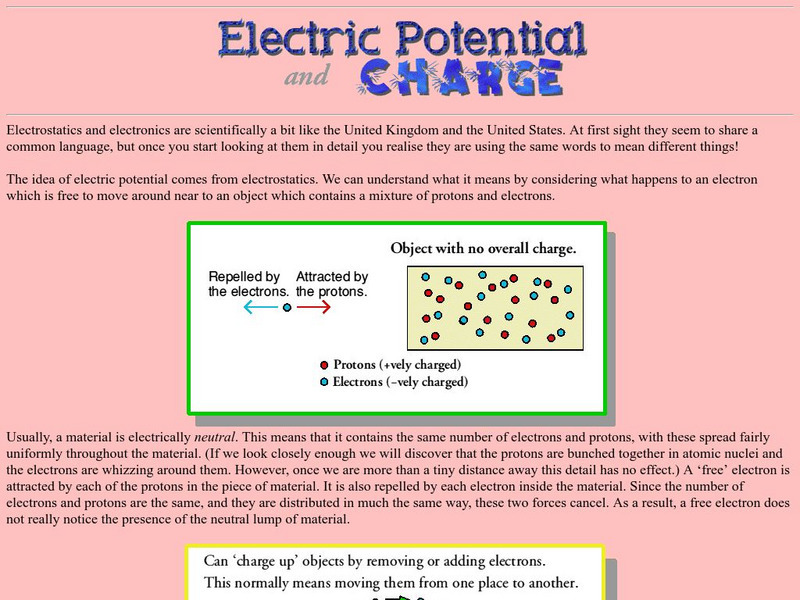Science Buddies
Science Buddies: Project Ideas: The Reasons for the Seasons
In this astronomy science fair project, investigate how the earth's axial tilt creates seasons. The Science Buddies project ideas are set up consistently beginning with an abstract, objective, and introduction, followed by a section on...
Exploratorium
Exploratorium: A Guide to Astronomy Resources
A portal to resources on the sun, the Earth's neighboring planets, and the weather in space. Find out why Saturn is the "jewel of the Solar System" and explore what happens when Venus and Mercury make their rare transits across the sun.
NASA
Nasa: Astronomy Picture of the Day: Gamma Ray Quasar
A photograph and description of quasar 3C279 viewed in gamma-rays. It was unexpectedly discovered and was one of the brightest objects in the gamma-ray sky until it suddenly faded.
American Geosciences Institute
American Geosciences Institute: Astronomy
Eight hands-on lessons module in which students explore the characteristics of planet Earth, its moons, the sun, the solar system, planets, and the difference between science fact and science fiction.
Other
Astromador: Astronomia Para Amadores
This resources focuses exclusively on astronomy. It's packed with historical facts about space exploration, famous people who pioneered the study of stars and planets. It features chronological list of space exploration, current news,...
Other
Mesopotamia: Astronomer: Astronomers of Babylon
Study the Babylonians accomplishments in astronomy. This early civilization developed a calendar and were able to predict near-future events based on the reading of the stars. Scroll through a story and engage in a challenge reinforcing...
Other
Explorable: Ancient Astronomy, Science and the Ancient Greeks
Discusses the influences of other cultures on ancient Greek astronomers, and the advances made by the Greeks. It highlights major astronomers and those who contributed important ideas from the 6th to the 2nd centuries BC, including...
Other
Astro Mia: Tierra, Sistema Solar Y Universo
This site is a good resource to study Astronomy. It has six sessions: the Universe, the solar system, the earth and the moon, history of Astronomy, articles, famous astrologers and a glossary.
Other
Hong Kong Space Museum
Besides an introduction to exhibitions and events at the museum, the site provides a guide to stargazing, an astronomy FAQ, space news, virtual tours (see site map) and research resources (including Chinese-English star and constellation...
Other
Canal Kids: Ciencias (Science for Portuguese Speakers)
Colorful, engagingly written information about astronomy and biology for Portuguese-speaking English language learners. Both subjects are broken down into a broad array of related subtopics. The biology section is particularly helpful...
American Museum of Natural History
American Museum of Natural History: Ology: Astronomy: In Pictures: Beyond Planet Earth
What would it be like to travel across the solar system and explore space? Take a look at some of the places that humans might go to someday, and the questions that scientists are asking.
Other
History of Islamic Science 3: The Time of Al Razi
In-depth look at Islamic society during the time of al-Razi. Discusses "Arabic Mathematics and Astronomy," "Muslim Alchemy and Physics," "Muslim Medicine," and several well-known individuals such as al-Mahani, inb Yusuf, al-Nairizi, ibn...
NASA
Nasa: Electromagnetic Spectrum: Radio Waves
Radio waves have the longest wavelengths in the electromagnetic spectrum. This NASA article discusses AM, FM, TV, cell phone, as well as radio astronomy, which all use this technology.
Science Buddies
Science Buddies: Kinesthetic Astronomy: Earth's Rotation
This kinesthetic activity will demonstrate concepts like rotation and orbit, clarify movement and direction, and help young scholars understand why earthlings see different things in the sky.
Science Buddies
Science Buddies: Kinesthetic Astronomy: Longer Days, Shorter Nights
This kinesthetic activity demonstrates to students that the Earth's tilt is what is responsible for shifting light patterns and the change in seasons.
Annenberg Foundation
Annenberg Learner: Five Question Survey: Basic Astronomy?
Find out your or your students' understanding of astronomy. To be used as a pre-assessment, your students can compare what they already know.
Cornell University
Cornell University: Astronomy: Orbital Motion and Kepler's Laws
At this site from the Astronomy Department of Cornell University, Kepler's three laws of planetary motion are stated. There are brief explanations of each, along with links to additional information on related subjects.
University of Maryland
University of Maryland: The Astronomy Workshop
Find tools to calculate astronomical distances and sizes, to view various Solar System models, to compare gravity's affect on weight, and more. A good place to find interesting facts, simple animations, and astronomy links to physics and...
Other
National Optical Astronomy Observatory: A Planetary Nebula Sampler
A planetary nebula forms when a star can no longer support itself by fusion reactions in its center. This NOAO site is also illustrated.
Ducksters
Ducksters: Astronomy for Kids: Astronauts
Kids learn about the astronauts who travel and explore outer space including spacesuits, fun facts, and famous adventurers like Buzz Aldrin, Yuri Gagarin, and Sally Ride.
Ducksters
Ducksters: Astronomy for Kids: Stars
Kid's learn about the science of stars like our Sun. Giant hot balls of gas and energy made mostly of hydrogen and helium.
University of Massachusetts
U Mass Astronomy: Five College Radio Astronomy Observatory
Resource provides basic information about the telescope and research projects being done there.
Other
Radio Sky Publishing: Site for Amateur Radio Astronomy
Site describes multiple resources for the beginner amateur radio astronomer. Great general information for beginners on basic radio physics and on the fundamentals of radio telescopes. Nice set of links to other useful sites.
University of St. Andrews (UK)
University of St. Andrews: Physics and Astronomy: Electric Potential and Charge
From The Scots Guide to Electronics web site. The meaning of electric potential is described. A combination of diagrams and words are used to explain this difficult concept without the use of mathematics. Very well done!
Other popular searches
- Astronomy and Space Science
- Astronomy Vocabulary
- Planets and Astronomy
- Astronomy Activity
- Science Astronomy
- Ancient Astronomy
- Astronomy Lesson Plans
- History of Astronomy
- Space Science Astronomy
- Space and Astronomy
- Astronomy Navigation
- Astronomy History














